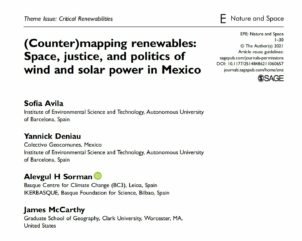
By Sofia Avila, Yannick Deniau, Alevgul H. Sorman and James McCarthy.
Find the full Research Article here: https://doi.org/10.1177/25148486211060657
Abstract
The ongoing expansion of renewable energies entails major spatial reconfigurations with social, environmental, and political dimensions. These emerging geographies are, however, in the process of taking shape, as their early configurations are still open to democratic intervention and contestation. While a recent line of research highlights the prominent role that maps are playing in directing such processes, the potential effects of countermapping on these evolving geographies have not yet been explored. In this article, we present a countermapping initiative promoting a dialogue between critical geography, political ecology, and environmental justice. Our work is the result of an alliance between Geocomunes—a collective of activist cartographers based in Mexico—and the EjAtlas—a global collaborative project tracking cases of grassroots mobilizations against environmental injustices. We take the case of Mexico’s low-carbon development strategy to dissect the spatial expansion of wind and solar mega-projects at both national and regional scales. Our project consists of a series of databases and maps aimed to “fill” the spaces and relations otherwise “emptied” by the state’s cartographic tools designed to promote investments in the sector. When presenting our results, we highlight how renewable energy projects in Mexico have so far juxtaposed with local territories, peoples, and resources, in ways that trigger instances of environmental injustice on the ground. We close this article by discussing the role of critical cartography and countermapping in building alternative political–economic projects for the energy transition.
Read it now here.

The project ENVJUSTICE has received funding from the European Research Council (ERC) under the European Union’s Horizon 2020 research and innovation programme (grant agreement No. 695446)